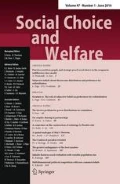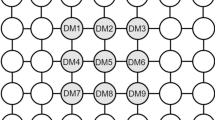Abstract
This paper explores some aspects of the relation between aggregation and deliberation as ways of achieving a consensus amongst a group of indviduals on some set of issues. I argue firstly that the framing of an aggregation problem itself generates information about the judgements of others that individuals are rationally obliged to take into account. And secondly that the constraints which aggregation theories typically place on consensual or collective judgements need not be consistent with the outcomes of rational deliberative processes driven by individuals’ attempts to update on this information. The paper focuses on the particular case of allocation problems, for which there are established results both in aggregation theory and deliberation theory, to make this claim.
Similar content being viewed by others
References
D’Aspremont C, Gevers L (1977) Equity and the informational basis of collective choice. Rev Econ Stud 44:199–209
Broome J (1990) Bolker-Jeffrey expected utility theory and axiomatic utilitarianism. Rev Econ Stud 57:477–502
Berger RL (1981) A necessary and sufficient condition for reaching consensus by De Groot’s Method. J Am Stat Assoc 76:415–418
Bohman J (1996) Public deliberation: pluralism, complexity and democracy. MIT Press, Cambridge
Bradley R (2005) Axiomatic Bayesian utilitarianism and probability homogeneity. Soc Choice Welfare 24:221–251
De Groot MH (1974) Reaching a consensus. J Am Stat Assoc 69:118–121
Dietrich F, List C (2007a) A Liberal Paradox for Judgment Aggregation. Soc Choice Welfare (in press)
Dietrich F, List C (2007b) Arrow’s Theorem in Judgement Aggregation. Soc Choice Welfare (in press)
Dryzek JS (1990) Discursive democracy. Cambridge University Press, Cambridge
Fishkin JS (1991) Democracy and deliberation: new directions for democratic reform. Yale University Press, New Haven
Gaertner W (2006) Domain conditions in social choice theory. Cambridge University Press, Cambridge
Genest C, Zidek JV (1986) Combining probability distributions: a critique and annotated bibliography. Stat Sci 1(1):113–135
Gevers L (1979) On interpersonal comparability and social welfare orderings. Econometrica 47:75–89
Goodin RE (2001) Consensus interruptus. J Ethics 5:121–131
Jeffrey RC (1983) The logic of decision. 2nd ed. University of Chicago Press, Chicago
Jeffrey R (1992) Probability and the art of judgement. Cambridge University Press, Cambridge
Laddaga R (1985) Leher and the consensus proposal. Synthese 36:473–477
Lehrer K (1976) When rational disagreement is impossible. Noûs 10:327–332
Lehrer K (1983) Rationality as weighted average. Synthese 57:283–295
Lehrer K, Wagner C (1981) Rational consensus in science and society. Reidel, Dordrecht
Levi I (1980) The enterprise of knowledge: an essay on knowledge, credal probability and chance. MIT Press, Cambridge
List C, Pettit P (2002) Aggregating sets of judgements: an impossibility result. Econ Philos 18:89–110
Loewer B, Laddaga R (1985) Destroying the consensus. Synthese 62:3–11
McConway (1981) Marginalization and linear opinion pools. J Am Stat Assoc 76:410–414
Mongin P (1995) Consistent Bayesian Aggregation. J Econ Theory 66(2):313–351
Roberts K (1980) Interpersonal comparability and social choice theory. Rev Econ Stud 47:421–439
Rubinstein A, Fishburn P (1986) Algebraic aggregation theory. J Econ Theory 38:63–77
Seidenfeld T, Kadane JB, Schervish (1989) On the shared preferences of two bayesian decision makers. J Philos 86:225–244
Sen A (1970) The impossibility of a paretian liberal. J Polit Econ 78:152–157
Sen A (1982) Collective choice and social welfare. Oliver and Boyd, Edinburgh
Sunstein CR (2002) Conformity and dissent. U Chicago law & economics, Olin Working Paper No. 164; and U Chicago, Public Law Research Paper No. 34
Wagner C (1978) Consensus through respect: a model of rational group decision-making. Philos Stud 34:335–349
Wagner C (1982) Allocation, Lehrer models, and the consensus of probabilities. Theory Decis 14:207–220
Wagner C (1985) On the formal properties of weighted averaging as a method of aggregation. Synthese 62:97–108
Author information
Authors and Affiliations
Corresponding author
Rights and permissions
About this article
Cite this article
Bradley, R. Reaching a consensus. Soc Choice Welfare 29, 609–632 (2007). https://doi.org/10.1007/s00355-007-0247-y
Received:
Accepted:
Published:
Issue Date:
DOI: https://doi.org/10.1007/s00355-007-0247-y




